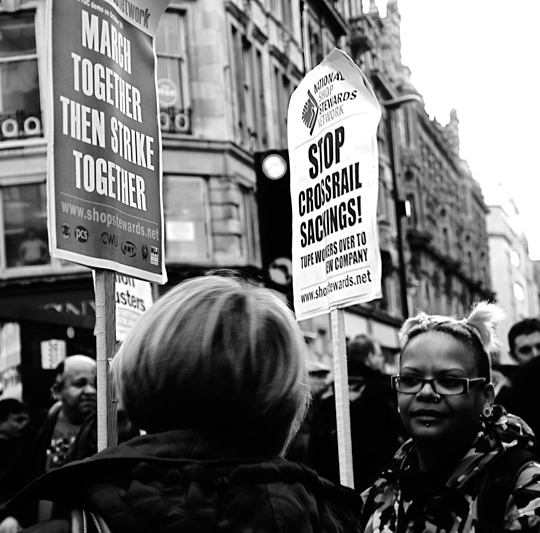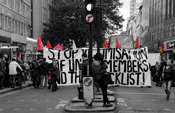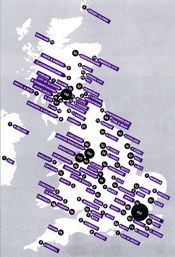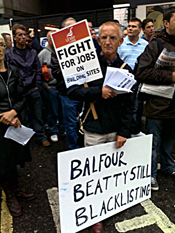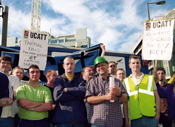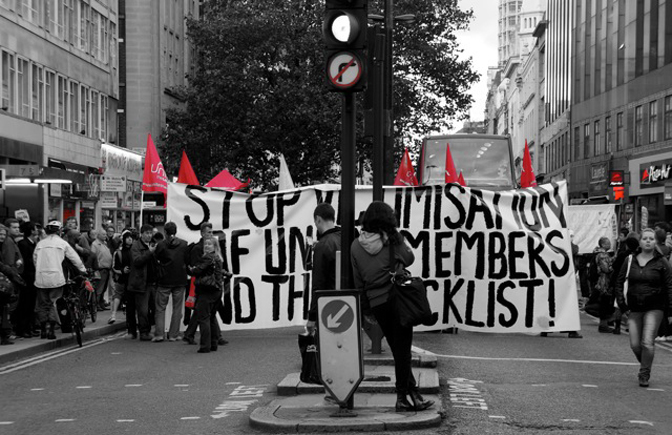
Workers knew there was a blacklist. Raise safety concerns and soon after your services were no longer needed. Site firms begging for labour somehow didn’t need your skills. But the industry said there was no such thing as a blacklist and the authorities refused to investigate.
But in 2009, the Information Commissioner’s Office raided the premises of The Consulting Association (TCA) and grabbed illegally held surveillance files on over 3,000 workers. The organisation was shutdown, and an ongoing parliamentary committee set about investigating a problem the industry had claimed did not exist.
Documents provided by the head of the TCA, Ian Kerr, who died in December 2012, were published in February 2013 by the Scottish Affairs select committee and included a table of membership and usage charges by 34 contractors from 1996/7 until the organisation was closed in 2009. TCA was established in 1993.
Sir Robert McAlpine was the largest user of the now-defunct organisation during this 13-year period, with a total spend of £220,000. This was just ahead of Skanska at £216,000, including vetting by a business Skanska acquired in 2000.
More than half of the country's leading construction firms were still using the blacklist when the operation was shut down, paying a £3,000-a-year subscription plus £2.20 for each blacklist check. Major firms, which have been called to appear before the select committee, admit they used blacklisting services in the past. But they all say it is a practice they no longer support.
Different names, same blacklist
We’ve been here before. In the 1980s, the Economic League – the blacklisting predecessor of The Consulting Association – was the subject of campaigns by grassroots groups including the Construction Safety Campaign. Employers denied then the existence of the organisation or blacklisting.
Following a parliamentary inquiry in 1990, The Economic League’s activities were exposed and in 1993 the discredited organisation shut up shop.
But it didn’t disappear entirely. Instead, two daughter organisations, TCA and Caprim Ltd, emerged, both supported by UK construction giant Sir Robert McAlpine and both headed by former employees of the Economic League. TCA specialised in surveillance of construction workers, but activists in associated industries, including rail and offshore, as well as environmental campaigners, were also in its crosshairs.
Caprim – which folded voluntarily in 2009 following the TCA closure - had different priorities, briefing firms in the agrochemical, arms and pharmaceutical industries. Clients included Monsanto, Glaxo-Smith Kline, Rhone Poulenc, Rio-Tinto and JP Morgan.
In recent months, the former heads of both blacklisters, Jack Winder at Caprim and Ian Kerr at TCA, admitted at the select committee to liaising regularly with senior police officers.
The Blacklist Support Group (BSG), formed in 2009 after TCA’s activities were exposed (Hazards 107), is spearheading legal actions to get compensation for affected workers and to get a formal investigation into the practice, including complicity by the police with illegal blacklisting organisations. Its campaign, which has gained national prominence and is now backed by the Labour Party leadership and trade unions, is ensuring the issue doesn’t go away.
BSG says recent experiences with the London Olympics and the Crossrail project – which TCA’s Ian Kerr confirmed in 2012 had used its services - mean it is not going to be taken in by a second round of assurances by the government and former blacklist users that the practice had been discontinued.
Even the industry concedes the blacklist was used on recent major projects. Following a similar admission by Balfour Beatty’s top brass, Sir Robert McAlpine director Cullum McAlpine told MPs at a hearing of the select committee on 22 January 2013 that his firm had used TCA’s services to vet Olympics site workers.
Despite this, business secretary Vince Cable continues to resist calls for an official inquiry, telling the House of Commons on 23 January 2013: “If it is actually going on, it is a serious matter and it needs investigation. I, of course, will want to see it properly investigated, but we want some evidence.”
But his Labour shadow, Chuka Umunna, backed the call for an investigation. And Unite general secretary Len McCluskey said: “This is a scandal on the scale of phone hacking, except it is the lives of thousands of ordinary construction workers which have been ruined. There should be a full and proper inquiry.”
He added: “Lives have been ruined and families have been torn apart just because workers have raised safety concerns in Britain's most dangerous industry or just because they exercised their human rights to belong to a trade union.”
 |
| SHOPPED! The Blacklist Support Group has made sure the issue has remained in the public eye, organising flash mobs at construction sites where workers have been victimised and protests like this 2012 march down London’s Oxford Street. Under pressure business secretary Vince Cable has resisted calls for an investigation, but on 28 January 2013 wrote to Information Commissioner Christopher Graham, noting: “I would like to meet with you to discuss how best to handle any evidence of any ongoing blacklisting that might emerge, drawing on your experience of the original investigation into The Consulting Association.” |
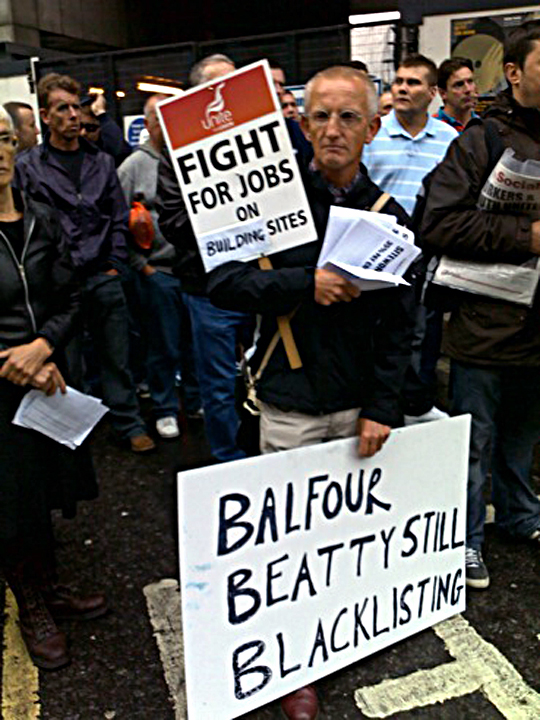 |
| HEAVY VETTING Major UK construction firms and blacklisting agencies have admitting covert vetting was used on some of the UK’s largest recent construction projects, including the London Olympics site and the Crossrail project (Hazards 120). Steve Murphy, general secretary of UCATT, said “this is far from the end of the story. We need a full investigation into the true level of blacklisting on the Olympics and other public projects, to find out who was involved and who knew about it.”
|
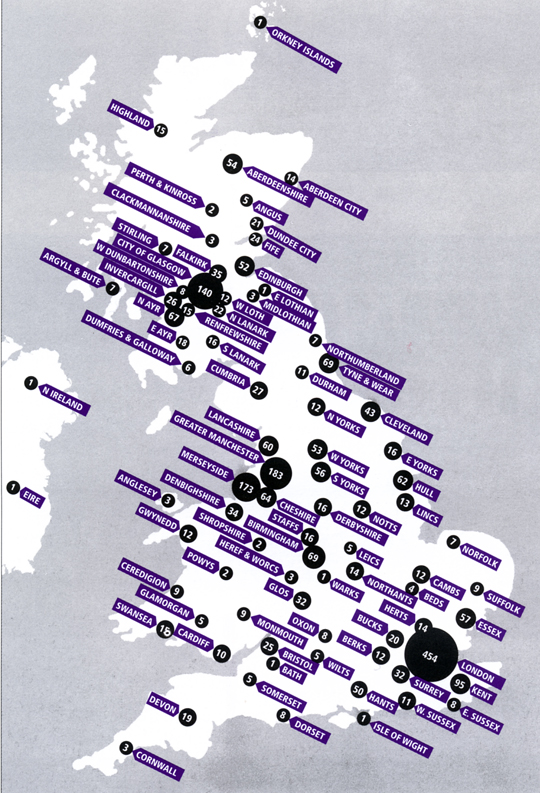 |
| NATIONAL SCANDAL GMB has published a map setting out where the 3,213 workers on the TCA blacklist either lived or worked. Paul Kenny, GMB general secretary, said: “GMB is calling on local councils not to award any new public work to the companies that operated the blacklist till they compensate those they damaged.” |
|
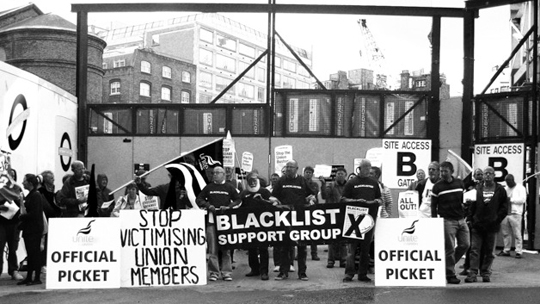 | <
| CROSSHAIRS Flagship public projects such as the ongoing £15bn Crossrail network provide clear warning signs that blacklisting is not dead, Unite has said. The union said it has “continuing and serious concerns”, after a House of Commons committee heard in November 2012 that Crossrail contractors used covert blacklisting organisation The Consulting Association, something confirmed to MPs by Ian Kerr, who headed the organisation until it was closed in 2009. |
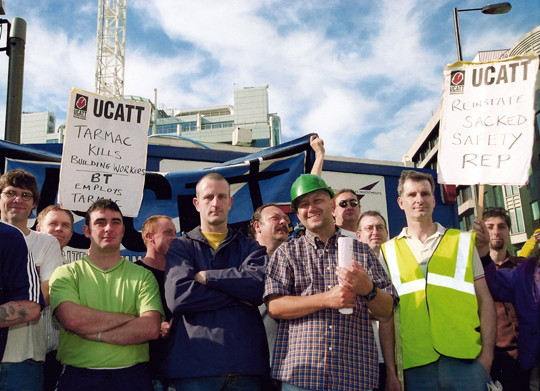 |
GOING SOMEWHERE Dave Smith (wearing the hard hat above), a former UCATT rep and target of The Consulting Association, had a 36-page file against his name and was victimised for highlighting safety hazards on sites. The file, which led to him being forced out of the industry, centred on his union safety activities. It included reference to this job on London’s Barbican centre in 1989, when workers took industrial action over safety abuses. Dave now coordinates the Blacklist Support Group, which in four years has ensured blacklisting firms haven’t been able to evade official scrutiny. It has won major accolades, including the Hazards Campaign’s 2010 ‘Alan’ Award (below) for safety activism and a November 2012 nomination for Liberty’s human rights campaign of the year.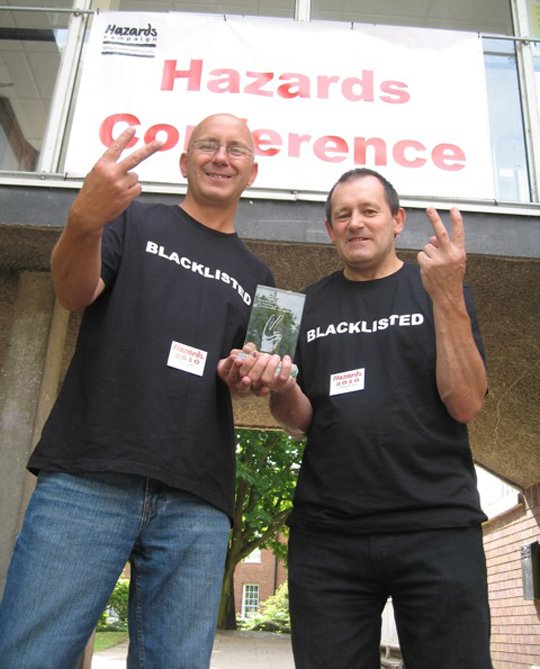 |
Blacklist
Thousands of workers on a construction blacklist lost their livelihoods as a result. A Hazards photofile features the stunning Blacklist Support Group campaign that exposed collusion between employers and the police and inaction by the government.
Blacklist Support Group AGM
The largest meeting of blacklisted workers ever assembled in one place, to discuss the ongoing campaign against the illegal construction industry blacklist in the courts, in parliament, with the unions and on the sites. Speakers include union general secretaries Len McCluskey of Unite, GMB’s Paul Kenny and UCATT’s Steve Murphy, plus Professor Keith Ewing and John Hendy QC.
10:30am-4:00pm, 23 March 2013. Syracuse University London, Faraday House, 48-51 Old Gloucester Street, London WC1N 3AE.
Blacklist Support Group blog, facebook group and YouTube video. email: blacklistsg@gmail.com
Images
Click on images for larger versions
Hazards webpages
Working world • Deadly business

